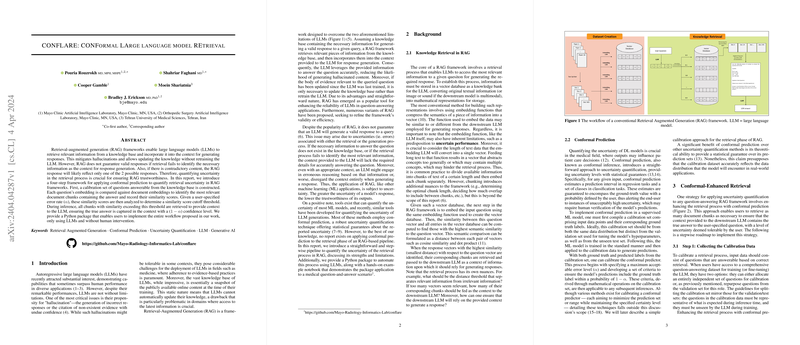Enhancing Retrieval-Augmented Generation Frameworks with Conformal Prediction
Introduction
Retrieval-augmented generation (RAG) frameworks represent a significant advancement in the application of LLMs for generating valid responses based on available knowledge bases. Despite their utility, RAG frameworks are susceptible to challenges such as generating hallucinated content and failing to provide updated information without retraining. This paper introduces a novel method to address these challenges by integrating conformal prediction within the RAG framework, thereby quantifying retrieval uncertainty and enhancing the trustworthiness of generated responses.
RAG Frameworks and Their Limitations
The foundational concept of RAG involves retrieving relevant information from a knowledge base to inform LLMs during the response generation process. Despite its advantages, such as mitigating hallucinations and simplifying knowledge updates, RAG cannot ensure the generation of valid responses in every instance. Failures in identifying necessary information or encountering contradictory content can significantly undermine the effectiveness of RAG frameworks. The paper thoroughly discusses these limitations and underscores the necessity of quantifying uncertainty in the retrieval process to enhance the reliability of RAG.
Quantifying Uncertainty with Conformal Prediction
The paper offers a detailed exposition on applying conformal prediction to quantify uncertainty, specifically within the retrieval phase of RAG frameworks. Conformal prediction, known for its robust uncertainty quantification capabilities, provides statistical guarantees about the reported uncertainty levels. The method outlined in the paper involves a four-step process that begins with constructing a calibration dataset and ends with adjusting the retrieval process based on a user-specified error rate. This innovative approach ensures that the retrieval process aligns with a predefined confidence level, substantially reducing the risk of including inaccurate or outdated information in the response generation process.
Implementation and Practical Implications
A significant contribution of this paper is the development of a Python package that facilitates the application of the proposed conformal prediction-enhanced RAG framework. By automating the workflow, the package encapsulates the complexity of the process, making it accessible to users without requiring extensive manual intervention. The practical implications of this research are vast, particularly in domains where accuracy and reliability of information are critical, such as in medical question-answering systems. The paper speculates on future developments, suggesting that further refinement of uncertainty quantification methods could substantially improve the versatility and reliability of LLMs across various applications.
Limitations and Future Directions
Despite its promising approach, the paper acknowledges several limitations, including the dependence on the representativeness of the calibration dataset and the performance of the embedding model. It also highlights the inherent uncertainty in the response generation phase, noting that even with precise retrieval, the final response may still reflect uncertainty, especially in cases of contradictory information. These insights not only underline the challenges ahead but also chart a course for future research focused on enhancing the reliability of RAG through improved uncertainty management.
Conclusion
The paper represents a significant stride toward addressing the inherent limitations of RAG frameworks by quantifying retrieval uncertainty through conformal prediction. This approach not only enhances the trustworthiness of RAG-generated responses but also opens new vistas for research in improving the accuracy and reliability of LLMs. As the field of generative AI continues to evolve, the methodologies and findings presented in this paper will undoubtedly influence the development of more sophisticated and reliable LLM applications.
